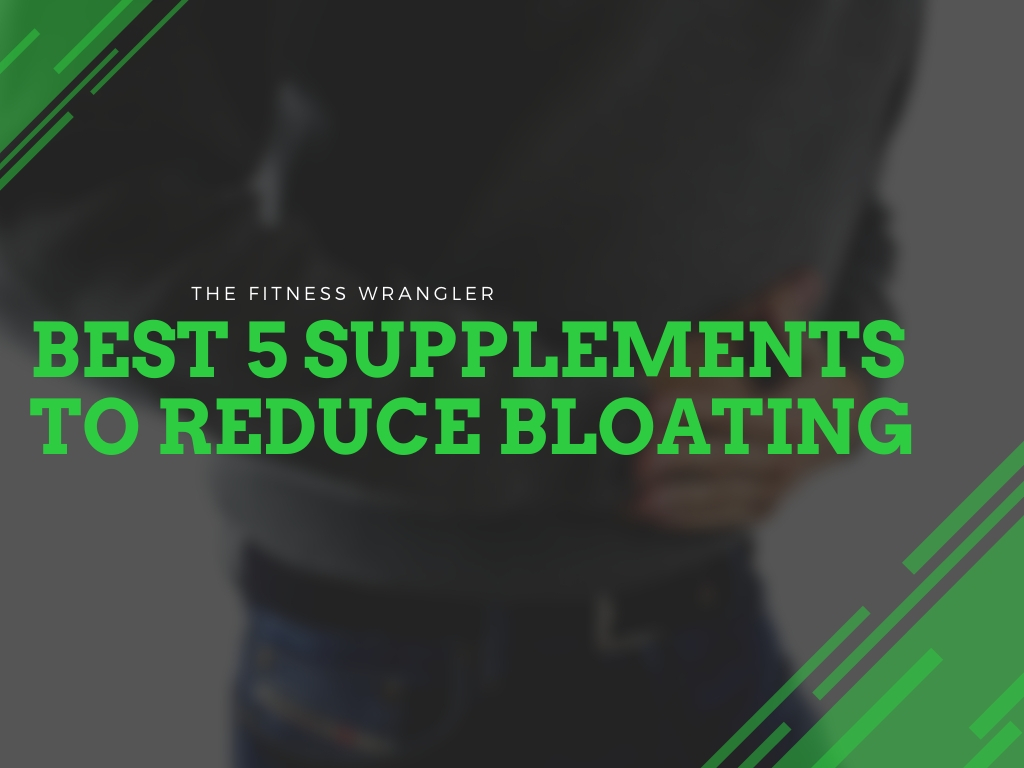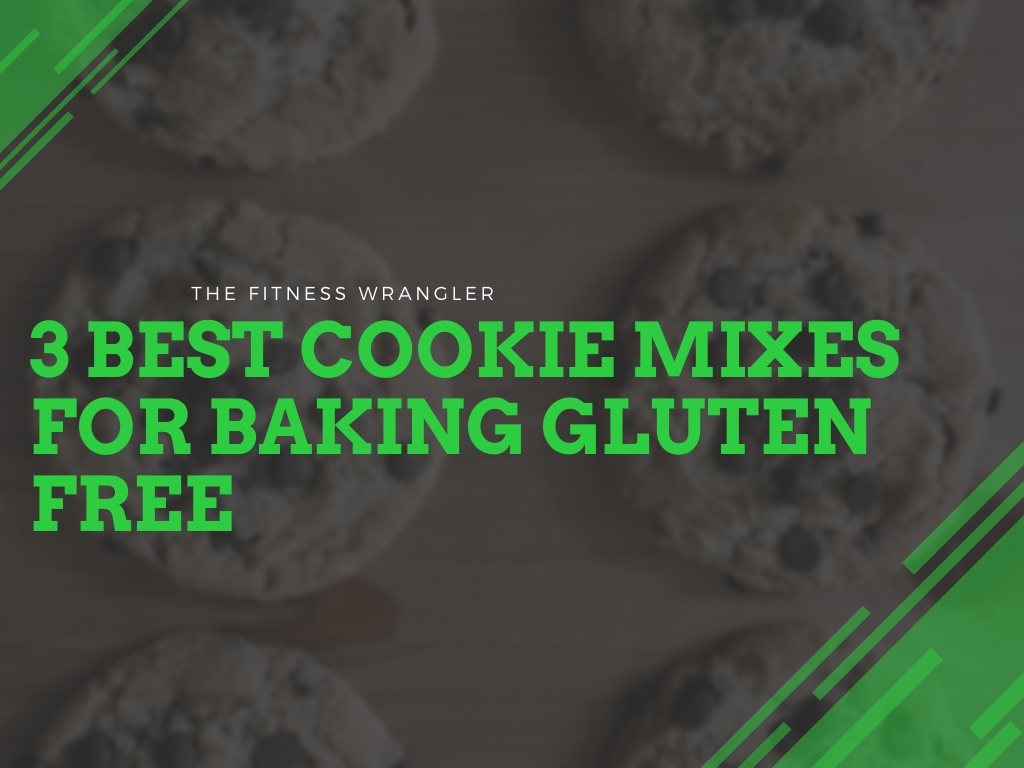Bloating sucks. I’m not talking about the kind of bloating that you get a little full from, I’m talking about the kind of bloating pain that’s gut wrenching and stomach twisting.
Not only does bloating suck but too much of it can mess up the digestion of food, slow down the processing power of nutrients and create deficiencies in our bodies that need alleviating.
At The Fitness Wrangler we strive for health in the long term while controlling our fitness today – all while enjoying the process with some good Paleo food!
In this article we’ll look at 5 different supplements that may help reduce bloating of the stomach.
How to Choose a Quality Supplement Product for use as a Bloating Remedy
The FDA doesn’t regulate supplements, but there are private groups that certify purity or facility standards. Look for seals on the package that indicates third-party testing. Some of the more common seals include ones from the Natural Products Association, USP Quality Supplements, and Good Manufacturing Practices (GMP).
Supplement Precautions
Taking a digestive enzyme supplement but not having an enzyme deficiency can cause nausea, diarrhea, and bloating of the stomach, things you are trying to avoid. Certain herbs can trigger allergic reactions in some people. Too much magnesium can be dangerous. Always talk to a trained medical practitioner before beginning any supplement routine.
Using Whole Foods to Reduce Bloating
There are good gut health foods that contain high levels of the enzymes or nutrients you may be lacking. Combining better food choices with specific supplements can give you much better results. It’s also important to remember NOT eating certain foods (ex: gluten and wheat) may be the best bloating remedy yet.
 Pineapple contains digestive enzymes called bromelain, which is a protease and aids in the breakdown of proteins. Studies on people that have pancreatic insufficiency found that increased bromelain, in addition to a pancreatic enzyme supplement, helped with bloating more than just a supplement.
Pineapple contains digestive enzymes called bromelain, which is a protease and aids in the breakdown of proteins. Studies on people that have pancreatic insufficiency found that increased bromelain, in addition to a pancreatic enzyme supplement, helped with bloating more than just a supplement.
Papayas contain papain, which is another protease. Adding ripe and uncooked papaya to your diet can help reduce constipation and bloating of the stomach in people who suffer from IBS.
Mangoes contain amylase, which breaks down carbohydrates from starch into sugars. Your pancreas and salivary glands make amylase enzymes. Eating more mangoes and chewing your food thoroughly can aid in digestion.
Honey, bananas, and avocados also contain digestive enzymes that may help your bloating pain. Meat and other animal products like eggs and milk can help you get sufficient L-glutamine and improve your overall intestinal health. Leafy green vegetables, bran, and brown rice are all great sources of magnesium.
Food is great for feeling less bloated but sometimes we just need some more help, that’s where these 5 supplements come into play.
Five Supplements to Reduce Bloating
1. Digestive Enzymes
The body naturally secretes certain digestive enzymes to aid in food digestion. The most important of these enzymes are proteases that break down proteins, lipases for fats, and amylases that deal with starch and sugar. Glands in the mouth, small intestine, gallbladder, stomach, and pancreas produce these enzymes when they are functioning correctly. Digestive enzyme supplements are designed to pick up the slack when that isn’t the case.
If you have inflammatory or irritable bowel disease, chronic pancreatitis, or have had your gallbladder removed, then digestive enzymes might be helpful. You can find out if you have an enzyme deficiency by having your feces tested at a medical laboratory.
Lean Nutraceuticals Full-Spectrum Enzymes Capsules are a combination of 13 naturally occurring food enzymes. These supplements are non-GMO and vegetarian. They are manufactured in a facility that is FDA and Good Manufacturing Practices (GMP) approved. They also undergo a third-party safety test for purity.
These digestive enzyme supplements from Lean Nutraceuticals only contain enzymes that have been scientifically proven to aid in digestion. The blend contains three times more protease than other brands to assist in protein break-down.
Pros:
- The digestive enzymes in this supplement are designed to relieve bloating and discomfort.
- These enzymes also promote the absorption of food nutrients.
- The digestive protein blend contains Protease with neutral, low, and high ph.
- The carbohydrate digestive blend is made up of amylase, glucoamylase, and beta-glucanase.
- The sugar and dairy digestive blend contains lactase and invertase.
- The fats and oil digestive blend has lipase and phytase.
- The fiber and legume blend is composed of cellulase, hemicellulase, and alpha-galactosidase.
Cons:
- You may not need all of these digestive blends, depending on your diet.
- Some people have experienced headaches or other reactions when taking these pills.
- Digestive enzyme supplements may interact with other medications.
2. L-Glutamine
L-glutamine is the most abundant amino acid found in blood and other bodily fluids. Because it is a conditionally essential amino acid, if your body is not producing enough L-glutamine, it must be obtained through supplements. Eating meat and other animal products is the best way to get sufficient L-glutamine. It is also found in white cabbage, beans, beets, and tofu in lesser quantities.
L-glutamine is an essential energy source for intestinal cells. It strengthens the barrier between the intestines and the rest of the body. Without enough L-glutamine, leaky gut develops. Leaky gut can lead to IBD, IBS, and celiac disease. Illness, infection, radiation treatment, shock, trauma, burns, or exercise can deplete L-glutamine levels.
L-glutamine not only is essential for good intestinal health but may also reduce muscle soreness and fatigue and improve recovery after intense exercise. There are health concerns regarding the long-term use of L-glutamine supplements since it changes the way your body processes amino acids. Certain types of cancer cells increase when exposed to L-glutamine. If you have cancer or are at risk of developing cancer, you should not take L-glutamine supplements.
Now Sports Nutrition L-Glutamine Powder is a supplemental L-Glutamine powder that can help improve your intestinal health. It can aid in strengthening the barrier between your intestine and the rest of your body.
Pros:
- These supplements have the Informed-Sport seal indicating that it has been tested for banned substances.
- This powdered supplement is not made with wheat, gluten, soy, milk, eggs, fish, shellfish or tree nuts.
- There are no artificial flavors or colors added.
- It has been manufactured in a GMP facility.
Cons:
- Long-term use is not recommended.
- The powdered form is designed to be mixed with juice and may not be convenient for everyone.
- Overdose may result in nausea, joint pain, or hives.
- The type of diet you eat affects the overall effectiveness of the supplement.
3. Peppermint
Peppermint can reduce gas, indigestion, and pain. It relaxes your digestive system and prevents smooth muscles from contracting, making it an excellent bloating remedy. It has been particularly useful in the short-term treatment of IBS. Peppermint oil might not be the best remedy if you have GI reflux, hiatal hernia, gallbladder problems, or kidney stones, however.
IBgard is a peppermint filled capsule supplement designed to be taken up to 90 minutes before a meal with water. In the event of an intestinal flare-up, two capsules can be taken three times a day for up to four weeks.
Pros:
- IBgard contains 90 mg of ultra purified peppermint oil.
- It is proven to work as fast as two hours after ingestion.
- Each capsule contains microspheres of peppermint oil.
- Site-specific targeting technology delivers the peppermint oil directly to the small intestine.
Cons:
- The capsules contain gelatin, so it is not vegetarian.
- This supplement has artificial colors.
- The capsules must be swallowed whole.
4. Iberogast
For a tested bloating remedy, you really can’t beat Iberogast. Ibergast has nine medicinal herb extracts designed to relieve abdominal pains, cramps, bloating, nausea, and gas. It relaxes the muscles in the gastrointestinal tract, which allows for better digestion.
Bitter candytuft (Iberis Amara) helps relax the smooth muscles of the small intestine and stomach. Angelica root, lemon balm, and peppermint can be used to treat disorders caused by impaired epithelial secretion in the intestine, like constipation.
Chamomile is useful in the treatment of ulcerative colitis. Caraway helps with digestion and reduces gas production in the gut. St. Mary’s thistle reduces liver toxicity. Greater celandine inhibits papain and reduces constipation. Licorice has long been used for its anti-inflammatory qualities in traditional Chinese medicine.
Pros:
- Ibergast has been clinically proven to reduce Functional dyspepsia (FD) and irritable bowel syndrome (IBS) symptoms.
- It is safe for long-term use.
- It does not contain salt, sugar, yeast, wheat, gluten, corn, soy, dairy products, artificial coloring, artificial flavoring, or preservatives.
Cons:
- It is manufactured in Europe, and shipping takes longer for some countries.
- Some people have reported allergic reactions to the herbs.
- It contains a small amount of alcohol.
- It comes in liquid form, and some people don’t like the taste.
5. Magnesium
Magnesium supplements are often prescribed for constipation and heartburn. It helps neutralize the acid in your stomach and moves stool through the intestine. Magnesium can be found naturally in bran, leafy green vegetables, brown rice, milk, and nuts. Nature Made High Potency Magnesium 400 mg are soft gel magnesium oxide supplements.
Pros:
- Nature Made Magnesium does not contain any preservatives or artificial colors.
- Softgels are easy to swallow.
Cons:
- The recommended daily allowance for a magnesium supplement is 350 mg, and this product comes in 400 mg soft gel dosages.
- Magnesium can cause stomach upset, nausea, vomiting, diarrhea in some people.
- Having inflammatory bowel disease will affect how much magnesium is absorbed by the body.
- Magnesium supplements can interact with antibiotics and other medications.
- Constipation is best treated with magnesium citrate.
- Indigestion is best treated with magnesium hydroxide.
- These soft gels contain soy and gelatin.
Conclusion and Next Steps
No one likes to feel bloated, especially not if that bloating is a horrendous feeling of agony.
It’s important to reduce bloating so that the intestines work properly in order to absorb the necessary nutrients.
There are many remedies for bloating, I’ve found these 5 to be very beneficial.
- Digestive Enzymes
- L-Glutamine
- Peppermint, IBgard
- Iberogast
- Magnesium
Please make sure you’re okay to take these by talking with your doctor if you’re unsure.
To move forward, simple choose one that catches your eye and try it out for a few weeks. It may take some time to see these kick in but if they’re worked for others just maybe it’ll work for you.
Disclaimers
I am not a doctor and do not recommend anything on this site, or blog post, for anyone without consulting with their doctor first. Please read the privacy policy for more information.
There are affiliate links in this post where I’ll get a paid fee if you purchase something from that link – it won’t cost any more to you and in some cases may even save you money.

















Leave A Comment